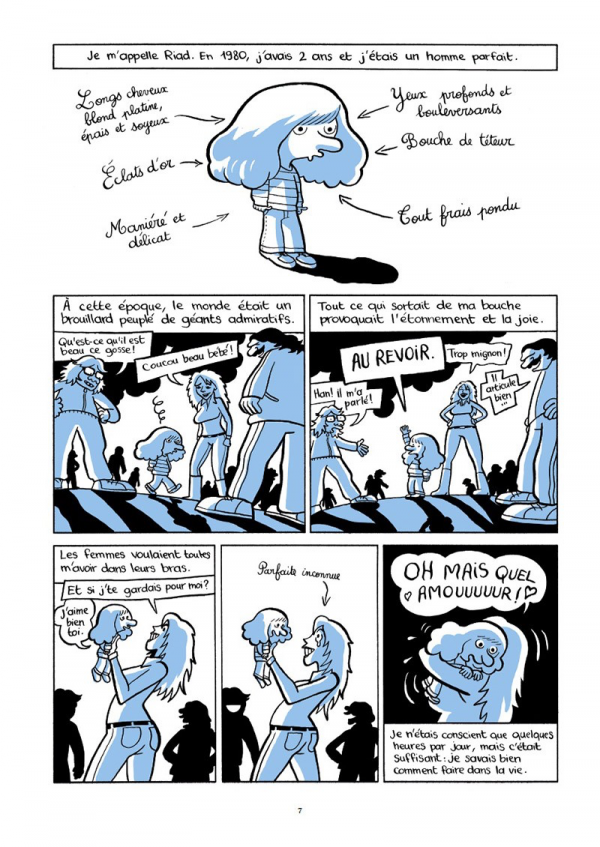
February 4, 2015
 Conversational Euro-Comics: Bart Beaty On L’Arabe Du Futur: Une Jeunesse Au Moyen-Orient (1978-1984)
Conversational Euro-Comics: Bart Beaty On L’Arabe Du Futur: Une Jeunesse Au Moyen-Orient (1978-1984)

 By Bart Beaty
By Bart Beaty
If I had been betting on which cartoonists was most likely to enter the ranks of two-time winner of the prize for best book at the
Festival International de la Bande Dessinée in Angoulême this past weekend,
Riad Sattouf would not have been the one that I would have laid my money on. Because Angoulême has restructured its prizes many times in its 42 years, it is difficult to make precise comparisons with the past, though by most understandings previous two-time winners are
Fred,
Baru,
Alan Moore,
Art Spiegelman, and
Christophe Blain. Sattouf, who won previously in 2010 for the third volume of his satiric
Pascal Brutal series, was awarded the Fauve d'Or again on Sunday evening, for his memoir,
L'Arabe du futur: Une jeunesse au Moyen-Orient (1978-1984).
At this point in his career, Sattouf is know as a man who wears many hats. In addition to the afore-mentioned parody of the hyper-macho contemporary man (
Pascal Brutal), he has published autobiographical works (the best of which is the anti-circumcision book,
Ma Circoncision), semi-autobiographical comics featuring his character Jérémie, and his weekly strips in
Charlie Hebdo,
La Vie secrète des jeunes (his contribution to the multi-million selling post-attack was one of the absolute highlights of that newspaper). In addition to his work as a cartoonist he has, like his friend
Joann Sfar, transitioned into filmmaking, having directed
Les Beaux Gosses in 2009 and
Jacky au royaume des filles in 2014. He has also done voice-acting for Sfar's
Petit Vampire television series.
So, a man of many talents. I was critical of the selection of
Pascal Brutal as the best book of 2010, but am much less so of
L'Arabe du futur, which I think is Sattouf's best book since
Ma Circoncision (though I am also a fan of
La vie secrete des jeunes, two volumes of which were collected by
L'Association).

This book is very much in the "sweet spot" of autobiographical works that tend to win acclaim in contemporary comics (it also won a prize from
RTL). The book tells the story of Sattouf, who was born in 1978 to a French mother and a Syrian father. When his father earns a PhD, he takes his family to live in Libya under
Muammar Gaddafi and then to Syria, under the dictatorship of
Hafez Al-Assad. The book is a relatively straightforward depiction of Sattouf's life in these two countries. It is told in a very direct way (lots of narration captions) with a keen eye for visual detail within the framework of Sattouf's extremely cartoony visual style.
For me, the book raises a number of very interesting questions about the nature of autobiography. As this is the first volume in an ongoing series, the book deals with only the first six years of Sattouf's life and memories. I don't know about you, but my memories of my life at that age would not fill a book -- at least not one with convincingly written dialogue about the nature of democracy and dictatorship in the Middle East. I know many readers who presume that Sattouf fictionalizes his ostensibly overheard work in
La vie secrète des jeunes (though he adamantly insists that the words spoken by his characters are, in fact, things that he has heard on the streets of Paris), and this is a book to give aid to the doubters. This is a very detailed family history from a narrator possibly too young to recall the nuances of what he lived through.
And, yet, what he lived through is gripping reading. The particularities of the socialist experiments in Libya and Syria at the period of pan-Arabism and Soviet support are fascinating. The book has something of the bizarre travelogue feeling that comes from
Guy Delisle's work, and the family confessional of
Marjane Satrapi. Both are clearly strong influences. Sattouf's portrait of his father is extremely unflattering in this volume, as is the image of the Middle East. This is a real "warts and all" portrait.

While Sattouf will never be considered one of comics's great visual stylists, he does use satirical cartooning traditions well. A highlight of the book is the use of color: chapters set in France are colored blue, Libya is yellow, and Syria is pink. Sattouf uses very occasional spot colors (on flags, for instance) in interesting moments. This is one of the more interestingly colored books of recent years. Kudos to
Allary Éditions for backing this lovely production.
I will not be surprised to see this book appear in an English edition in the future -- presumably when it has been completed. The subject is topical and fascinating and the craftsmanship is subtle but appealing. I don't think that I would have picked it as the best book of 2014 personally, but it is also not a grave injustice that Riad Sattouf is one of the most celebrated cartoonists in the history of the Angoulême festival either.
*****
*
L'Arabe Du Futur: Une Jeunesse Au Moyen-Orient (1978-1984), Riad Sattouf, Allary, 9782370730145, May 2014.
*****
To learn more about Dr. Beaty, or to contact him,
try here or
here.
Those interested in buying comics talked about in Bart Beaty's articles might try
here.
*****

*****
*****
posted 10:47 pm PST |
Permalink
Daily Blog Archives
November 2019
October 2019
September 2019
August 2019
July 2019
Full Archives


